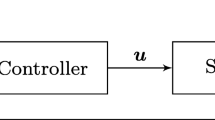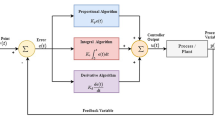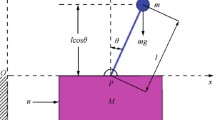Abstract
Many processes operated in chemical process industries show time-varying and highly nonlinear characteristics. This paper proposes an enhanced nonlinear PID (NPID) controller for the improvement of setpoint tracking or disturbance rejection responses and new tuning formulas for a FOPTD process model. The NPID controller has a structure with a first-order filter in the derivative term to avoid possible Derivative Kick. The parameters of the NPID controller are expressed in terms of the ratio L/τ of the time delay L to the time constant τ in the process by using the dimensionless approach. Repeated optimizations are performed for each value over the ranges of 0.01 to 1 and 1 to 3 of L/τ and over the ranges of 5 to 30 of the filter parameter N to obtain the average of optimal parameter values that minimize the integral of absolute error performance criterion. By using the least-squares method with together the calculated optimal values and the rule formulas, the tuning rules are obtained. A set of simulation works on the five processes are carried out to demonstrate tracking and disturbance performance and robustness against the noise of this approach.
















Similar content being viewed by others
References
Ashida Y, Wakitani S, Yamamoto T (2017) Design of an implicit self-tuning PID controller based on the generalized output. IFAC-Papers OnLine 50(1):13946–13951
Åström KJ, Hägglund T, Hang CC, Ho WK (1993) Automatic tuning and adaptation for PID controllers: a survey. Control Eng Practice 1(4):699–714
Åström KJ, Panagopoulos H, Hägglund T (1998) Design of PI controllers based on non-convex optimization. Automatica 34(5):585–601
Chen CT, Peng ST (1999) Learning control of process systems with hard input constraints. J Process Control 9(2):151–160
Chien KL, Hrones JA, Reswick JB (1972) On the automatic control of generalized passive systems. Trans ASME 74:175–185
GG Jin, YD Son (2019) Design of a nonlinear PID controller and tuning rules for first-order plus time delay models. Stud Inform Control 28(2):157–166
Guerrero J, Torres J, Creuze V, Chemori A, Campos E (2019) Saturation based nonlinear PID control for underwater vehicles: design, stability analysis and experiments. Mechatronics 61:96–105
Han J (2009) From PID to active disturbance rejection control. IEEE Trans Industr Electron 56(3):900–906
Hernández-Alvarado R, García-Valdovinos LG, Salgado-Jiménez T, Gómez-Espinosa A, Fonseca-Navarro F (2016) Neural network-based self-tuning PID control for underwater vehicles sensors. MDPI J/sensors 16(19):1429–1447
Hua H, Fang Y, Zhang X, Qian C (2020) Auto-tuning nonlinear PID-type controller for rotorcraft-based aggressive transportation. Mech Syst Signal Process 145:106858
Lee D, Cheon Y, Ryu JH, Lee IB (2017) An MCFC operation optimization strategy based on PID auto-tuning control. Int J of Hydrogen Energy 42(40):25518–25530
Lopez AM, Murril PW (1967) Tuning controllers with error-integral criteria. Instrum Technol 14:57–62
O'Dwyer A, (2006) Handbook of PI and PID Controller Tuning Rules, Second Ed. Imperial College Press, pp. 154–180
Pongfai J, Su X, Zhang H, Assawinchaichote W (2020) A novel optimal PID controller autotuning design based on the SLP algorithm. Expert Syst 37(2):e12489
Ray WH (1989) Advanced Process Control, 3rd edn. Butterworth Publishers, London
Rivera DE, Morari M, Skogestad S (1986) Internal model control: PID controller design. Ind Eng Chem Process Des Dev 25(5):252–265
Seraji H (1997) A new class of nonlinear PID controllers. In: Proceedings of the 5th IFAC Symposium on Robot Control 1997 (SYROCO ‘97), Nantes, France, pp. 65–71
Seraji H (1998) A new class of nonlinear PID controllers with robotic applications. J Robot Syst 15(3):161–181
Simorgh A, Razminia A, Shiryaev VI (2020) System identification and control design of a nonlinear continuously stirred tank reactor. Math Comput Simul 173:16–31
Skogestad S (2004) Simple analytic rules for model reduction and PID controller tuning. MIC---Model Identif Control 25(2):85–120
Sun Z, Sanada K, Gao B, Jin J, Fu J, Huang L, Wu X (2020) Improved decoupling control for a powershift automatic mechanical transmission employing a model-based PID parameter autotuning method. MDPI J/actuators 9(3):54–75
Young P (1981) Parameter estimation for continuous-time models—A survey. Automatica 17(1):23–39
Zhao J, Xi M (2020) Self-tuning of PID parameters based on adaptive genetic Algorithm. 2020 IOP Conf Ser Mater Sci Eng.782:042028.
Zhuang M, Atherton DP (1993) Automatic tuning of optimum PID controllers. IEE Proc-D 140(3):216–224
Ziegler JG, Nichols NB (1942) Optimum setting for automatic controllers. ASME Trans 64(8):759–768
Funding
No funding available.
Author information
Authors and Affiliations
Corresponding author
Ethics declarations
Conflict of interest
The Author(s) declare(s) that there is no conflict of interest.
Human participants and/or animals
Not applicable.
Informed consent
Not applicable.
Additional information
Publisher's Note
Springer Nature remains neutral with regard to jurisdictional claims in published maps and institutional affiliations.
Rights and permissions
Springer Nature or its licensor (e.g. a society or other partner) holds exclusive rights to this article under a publishing agreement with the author(s) or other rightsholder(s); author self-archiving of the accepted manuscript version of this article is solely governed by the terms of such publishing agreement and applicable law.
About this article
Cite this article
Son, YD., Jin, GG., Yetayew, T.T. et al. New tuning formulas for a nonlinear PID control scheme. Int J Syst Assur Eng Manag 14, 2470–2484 (2023). https://doi.org/10.1007/s13198-023-02094-w
Received:
Revised:
Accepted:
Published:
Issue Date:
DOI: https://doi.org/10.1007/s13198-023-02094-w




